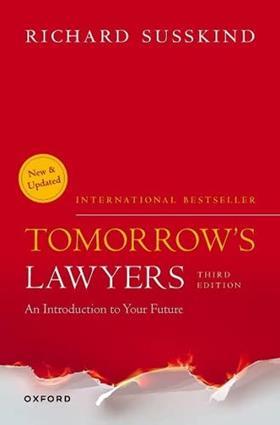Tomorrow’s Lawyers: An Introduction to your Future (3rd edition)
Richard Susskind
£16.99, Oxford University Press
★★★★
Why are there no comparison websites for lawyers? There are plenty for financial services, insurance companies and package holiday firms, but none for us. ‘Compare the Advocate?’, ‘TrivagSue?’ are some suggestions! We now have to publish some costs information on our websites. But perhaps cost comparison sites are something for the future. I consider this question with tongue firmly in my cheek. But it raises a serious question about how clients choose us and how much they are willing to pay. What is in store for the profession? This book attempts to answer that question.

Lawyers have always worried about what will become of them. I can remember, nearly 50 years ago, solicitors wondered about the implications of being forced to merge with the bar: would the bread and butter of solicitors’ work – the conveyancing monopoly – be removed in favour of the public doing their own house buying and selling? There were do it yourself guides which explained that it was just form filling and as straightforward as completing a passport application.
None of those things happened. The bar and solicitors remain separate. And hardly anyone does their own conveyancing. What has happened is that the level of fees for property work has collapsed. The public still want us but on the cheap. (Incidentally, passport forms are probably now so complicated you need a lawyer.) It is easy to predict the future but difficult to do it accurately.
This book’s subject matter is a vital topic and would appeal to a student choosing a degree course or apprenticeship, or someone in mid-career contemplating partnership, salaried employment or going on their own. It would also appeal to someone at or towards the end of their career thinking of succession. There are sections on the impact of Covid, the changing market, technology and prospects for young lawyers. And everyone should read the chapter on questions for junior lawyers to ask at interviews. There are some very interesting points and I am not sure that I would score well with my replies!
The author is correct in his views on billing. In all areas, the profession in all areas needs to get away from billing by time only. It is ridiculous if we cannot charge more for doing work quickly because you know what to do, as opposed to a junior who takes ages. This is particularly true for legal aid, though there have been improvements with the introduction of fixed fees, but there is room for more progress.
It is interesting that some of our fears did not materialise. Supermarket law did not happen, and even banks did not get far with doing conveyancing for customers. The jury is still out on external investment in legal firms. There have been some worrying failures. I question whether investors have the patience for the low returns the profession offers.
This book is written primarily for the larger firm, although there is plenty to interest all of us, in big or small firms. I could not see much in this book on publicly funded work. Perhaps that answers my question of whether there is a future for legal aid lawyers. Someone phoned me recently asking for a legal aid divorce lawyer. She had been phoning lots of firms and did not understand why she could not get help. When I said there was no legal aid for that, she did not seem to believe me and vowed to continue to ring round more firms. ‘Legal aid doesn’t cover all types of problem,’ the government website blandly puts it. Support for the limited legal aid budget is inadequate, though the message put out is still of greedy lawyers subverting the justice system.
This is an interesting and important book.
David Pickup is a partner at Pickup & Scott Solicitors, Aylesbury
- Would you be interested in writing a book review for the Law Society Gazette? The Gazette receives books on a range of legal specialisms, as well as fiction, history and biography. If you are interested please write to Nicholas Goodman indicating your specialism.
































No comments yet